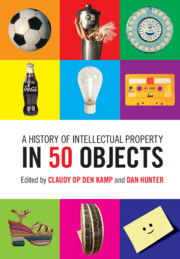Book contents
- Frontmatter
- Dedication
- Contents
- Acknowledgments
- Introduction: Of People, Places, and Parlance
- The Pre-Modern Period
- The Age of invention
- Modern Times
- The Consumption Age
- 26 Bell Transistor
- 27 Oral Contraceptive Pill
- 28 Photocopier
- 29 Elstar Apple
- 30 Chanel 2.55
- 31 Lego Brick
- 32 Barbie Doll
- 33 Coca-Cola Bottle
- 34 Zapruder Film
- 35 Audiotape Cassette
- 36 Action Figure
- 37 RAM-Chip
- 38 Football
- The Digital Now
- About The Contributors
32 - Barbie Doll
from The Consumption Age
Published online by Cambridge University Press: 12 June 2019
- Frontmatter
- Dedication
- Contents
- Acknowledgments
- Introduction: Of People, Places, and Parlance
- The Pre-Modern Period
- The Age of invention
- Modern Times
- The Consumption Age
- 26 Bell Transistor
- 27 Oral Contraceptive Pill
- 28 Photocopier
- 29 Elstar Apple
- 30 Chanel 2.55
- 31 Lego Brick
- 32 Barbie Doll
- 33 Coca-Cola Bottle
- 34 Zapruder Film
- 35 Audiotape Cassette
- 36 Action Figure
- 37 RAM-Chip
- 38 Football
- The Digital Now
- About The Contributors
Summary
THE BARBIE DOLL is a remarkable object— wasp-waisted, flesh-toned, the Venus of Hawthorne, CA, Mattel Inc.'s birthplace. But she is also a lesson in how copyright, trademark, patent can be used by companies to maintain desire. And just as Barbie is the very embodiment of unrequited desire, so too do intellectual property laws constrain consumers in their access to the objects of their lust. Barbie is, then, much more than a doll—she is an object lesson in the connection between lust, laws, money, and flesh-toned plastic.
Born on 9 March 1959, Barbie sprang forth from the imagination of Ruth Handler, one of the founders of the Mattel company and the mother of two children who were, improbably, also named Barbara and Ken. The official Mattel narrative holds that Barbie Millicent Roberts is a wholesome Midwestern gal, a “teenage fashion model” from Willows, Wisconsin. But the creation story of Barbie is more inflected than this, and less wholesome. Barbie was patterned on another doll, “Lilli,” which Ruth Handler chanced upon while on a European tour with her family. Spied in a toy store window in Lucerne, Switzerland, the dollwhich- would-become-Barbie was anything but a sweet teenage fashionista: she was the embodiment of a lewd cartoon character, created by Reinhard Beuthien for a tabloid German newspaper, Bild-Leitung. The character Lilli was an under-employed secretary who hooked on the side, or at least spent a great deal of time “socializing” with rich sugar daddies to supplement her income—a stereotype distressingly familiar in postwar Europe.
The Lilli dolls, developed by O&M Hausser, were released in 1955 and featured Lilli in various outfits, many of them racy. The dolls weren't intended for children, and were apparently bought by men as gag gifts for bachelor parties, as dashboard adornments, or as suggestive gifts for their girlfriends and mistresses.
On hearing that Lilli was a working girl, some commentators have tut-tutted at the sinful nature of Barbie's birth. But the sin emanated not from the doll, but from her creator. Mattel took the Lilli doll and knocked her off as the Barbie doll, with at best a slight cosmetic alteration: her hairline was adjusted to have a less pronounced widow's peak, and her eyebrows became less severely arched. Apart from these minor changes, the dolls were identical, even down to the sideways-glancing eyes on both dolls.
- Type
- Chapter
- Information
- A History of Intellectual Property in 50 Objects , pp. 264 - 271Publisher: Cambridge University PressPrint publication year: 2019



